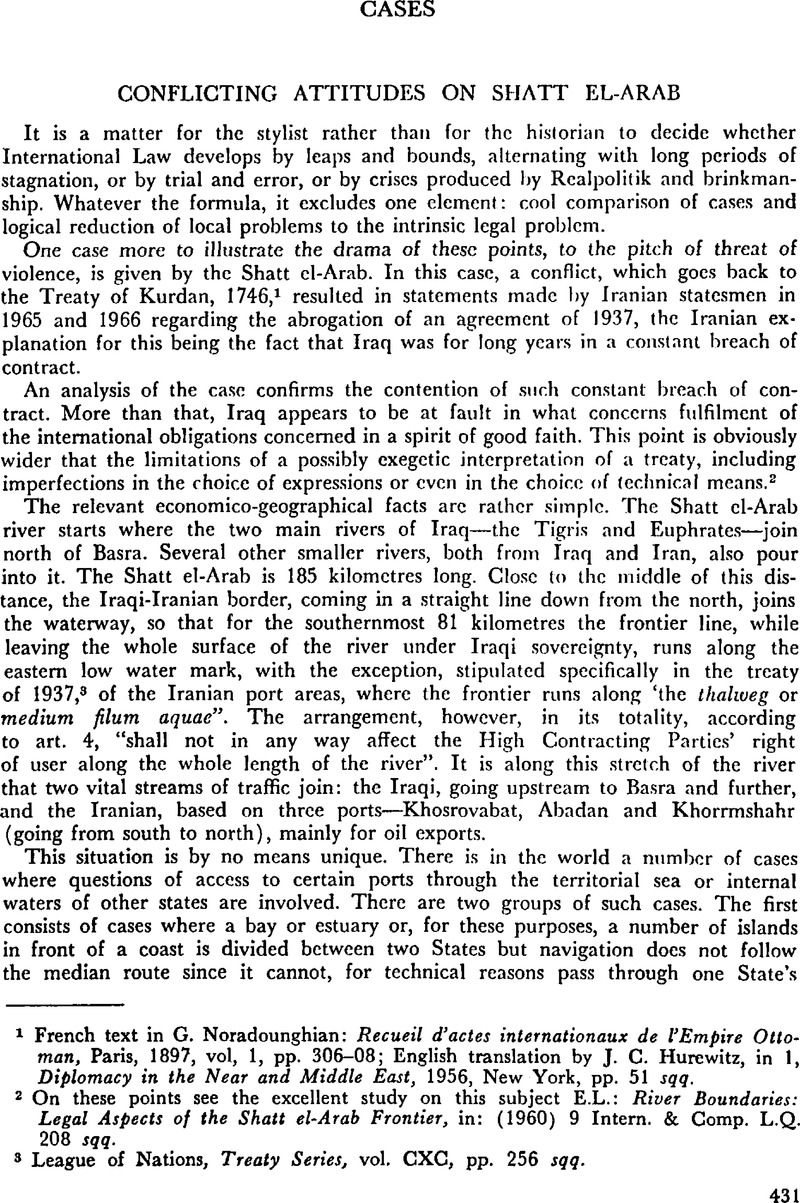No CrossRef data available.
Published online by Cambridge University Press: 12 February 2016

1 French text in Noradounghian, G.: Recueil d'actes internationaux de l'Empire Ottoman, Paris, 1897, vol, 1, pp. 306–08Google Scholar; English translation by Hurewitz, J. C., in 1, Diplomacy in the Near and Middle East, 1956, New York, pp. 51sqqGoogle Scholar.
2 On these points see the excellent study on this subject E.L., : River Boundaries: Legal Aspects of the Shatt el-Arab Frontier, in: (1960) 9 Intern. & Comp. L.Q. 208sqqCrossRefGoogle Scholar.
3 League of Nations, Treaty Series, vol. CXC, pp. 256sqqGoogle Scholar.
4 This, for instance, is a case concerning two States which confront each other in avowed hostility; nevertheless, nothing became known about difficulties erected in matters of access. The Lough is a two-nations bay, entered through a two-nations straits between Inishowen Head (Eire) and Magilligan Point (Northern Ireland, U.K.). At the point where the river Foyle reaches the bay, the boundary turns inland, so that the river and the town of Londonderry (U.K.) can be reached only through the bay; cf. U.N. doc. A/Conf. 13/15, p. 51.
5 A similar case, politically (for it opposes West Germany to East Germany) and geographically, considering access to the port of Lübeck (West Germany).
6 SirMance, O.: International River and Canal Transport, 1945, Oxford, p. 47sqqGoogle Scholar.
7 BGB1. Teil II, 1963, Nr. 18, pp. 458 sqq.
8 Appeal can be made to an arbitration tribunal. Economic questions will be discussed once a year at a meeting of representatives of Delfzijl and of Lower Saxony, Emden being part of that Bundesland.
9 For a recent restatement see: Whiteman, M.M., in (1964) 3, Digest of International Law, pp. 875sqqGoogle Scholar.
10 Art. 16(4) of the Geneva Convention on the Territorial Sea, 1958:
“There shall be no suspension of the innocent passage of foreign ships through straits which are used for international navigation between one part of the high seas and another part of the high seas or the territorial sea of a foreign State.”
This provision was adopted by a vote of 62 for, one against, and nine abstentions.
11 Blum, Y. Z.: Historic Titles in International Law (The Hague, 1965, pp. 177sqqCrossRefGoogle Scholar.); for the development of a community concept among the riperians concerned, see Lador-Lederer, J. J. in (1956) 53, Friedenswarte, Genf, pp. 225sqqGoogle Scholar. (Vom Wasserweg zur intcrnationalen Gemeinschaft) and in 11, Jahrbuch für Internationales Recht, 1962, Göttingen, pp. 213 sqq. (Die Debatte um den Rechtsstatus internationaler Meerengen und Kanäle.)
12 Hurewitz, l.c. pp. 90 sqq.
13 This encouraged the Iraqis to consider the boundary question unsettled and to bring the matter before the Council of the League of Nations, November, 1934. The Council appointed the representative of Italy as Rapporteur of the dispute; his intervention facilitated the negotiation of the agreement of 1937, so that the case was withdrawn from the Council agenda before a decision could be made; Whiteman, l.c. p. 904–05.
14 Scott, , Diplomatic Documents Relating to the Outbreak of the European War, Part II, 1916, pp. 1119sqqGoogle Scholar.
15 Khuzistan is a province important because of its wealth in oil and its position along the pipelines to Abadan; cf. Shwadran, B., The Middle East, Oil and the Great Powers, New York, 1955, pp. 20sqqGoogle Scholar.
16 See the instruments signed at Barcelona, 20 April 1921: Convention and Statute on Freedom of Transit, (Cmd. 1992) and Convention and Statute on the Regime of Navigable Waterways of International Concern, Cmd. 1993.